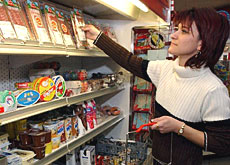
Slow economic recovery expected in 2003

The Swiss economy is set to recover gradually against a background of low inflation, according to researchers at the investment bank, Credit Suisse First Boston.
They are predicting real GDP growth of 1.1 per cent in 2003, increasing to 1.8 per cent in 2004. Inflation is predicted to stand at one per cent next year.
The figures are in line with those issued last month by the State Secretariat for Economic Affairs (Seco), which cut its growth forecast for 2003 from 1.7 per cent to one per cent.
Presenting the results of its study in Zurich on Tuesday, CSFB said that economic recovery would follow a period of underperformance against member states of the European Union.
“In 2003, we believe that growth is only going to pick up gradually, which means that it is still likely to underperform EU growth,” Nannette Hechler-Fayd’herbe, head of Swiss Fixed Income Research at CSFB, told swissinfo.
“However, in 2004, we believe that the flexible structures of the Swiss economy will allow it to grow to close the gap with the EU and to grow at 1.8 per cent, which is very close to our forecast for the EU,” she said.
But CSFB warned that changes in geo-political events and Swiss consumer spending could affect their prognosis.
“The unemployment rate is much lower [in Switzerland] than in the European Union, so one could have expected that private consumption would have held up better,” Hechler-Fayd’herbe said.
“However, we have been disappointed and we certainly see an area of weakness in the fact that unemployment will continue to rise and will continue to weigh on consumer confidence in Switzerland,” she added.
No deflation
The study, “Swiss Strategy and Relative Value”, says that Switzerland is not on the brink of deflation at present – deflation being defined as a period of generally falling prices.
Inflation is expected to be at one per cent or below for a prolonged period.
However, there are sectors that are not competitive and in which price levels are significantly higher than in neighbouring European countries.
Good examples, points out CSFB, include rents, meat, health services, transport services, restaurants and hotels, books and journals.
“While we do not expect Switzerland to slide into a deflationary spiral in the coming months, we expect increasing pressure to adjust prices in a number of sectors of the Swiss economy to converge more with European levels,” commented Hechler-Fayd’herbe.
Opposition to reform
However, she expects the process to be gradual as there is likely to be opposition to reform and restructuring from the more left-wing political parties and lobbying groups.
The study predicts the Swiss franc will depreciate somewhat against the euro, although it says that this should not be viewed as the beginning of a sustained underlying weakness.
“The Swiss franc is currently still on the overvalued side with respect to the euro and we therefore expect the franc on trend to correct to what we believe is the fair value, namely SFr1.49 against the euro,” Hechler-Fayd’herbe told swissinfo.
“Against the dollar on the contrary, the Swiss franc and the euro should continue to appreciate. Certainly there are some backflows from the US into Europe as far as direct investment and portfolio investment is concerned,” she added.
Political upheaval
The study also touches on next year’s parliamentary elections in Switzerland, questioning whether they will signal the beginning of the end for the so-called “Magic Formula” and political consensus.
Under the Magic Formula, drawn up in 1959, the seven-member Swiss cabinet is comprised of two Social Democrats, two members of the Radical Party, two from the Christian Democratic Party and one from the Swiss People’s Party.
The People’s Party is demanding a second cabinet seat after winning the biggest share of the popular vote in the 1999 general election.
It argues that the Magic Formula – designed to share out cabinet posts in a way that mirrors the linguistic and political landscape of Switzerland – has become undemocratic because it doesn’t represent electoral strength of the People’s Party.
“If Switzerland were to move from its broad coalition government to a majority government versus an opposition model, similar to other countries in Europe, this historical development would probably weigh on the Swiss franc,” commented Hechler-Fayd’herbe.
swissinfo, Robert Brookes in Zurich
CSFB sees zero economic growth this year, 1.1 per cent in 2003 and 1.8 per cent in 2004.
The bank believes inflation will stand at one per cent next year and in 2004.
The study forecasts a return by the Swiss franc to its “fair value”, just under SFr1.50 against the euro.

In compliance with the JTI standards
More: SWI swissinfo.ch certified by the Journalism Trust Initiative





































You can find an overview of ongoing debates with our journalists here . Please join us!
If you want to start a conversation about a topic raised in this article or want to report factual errors, email us at english@swissinfo.ch.